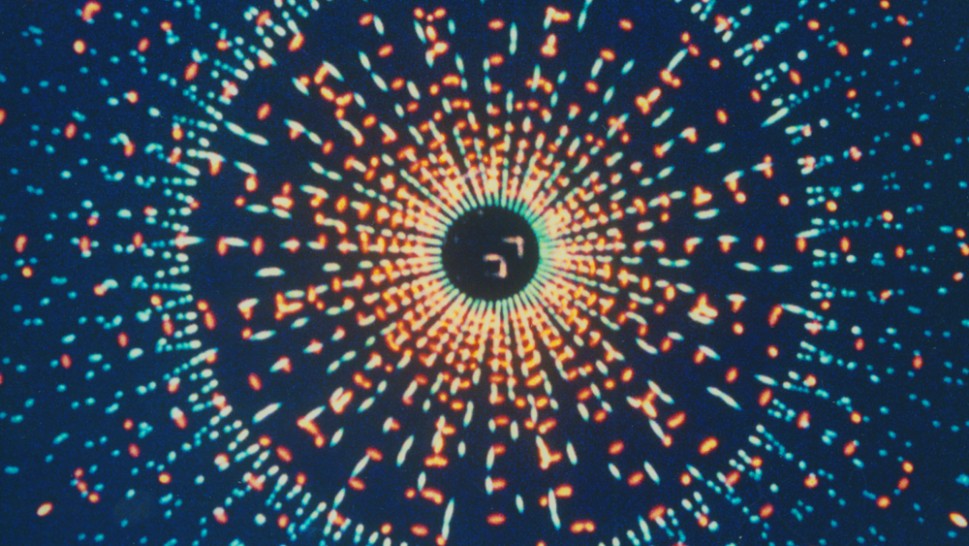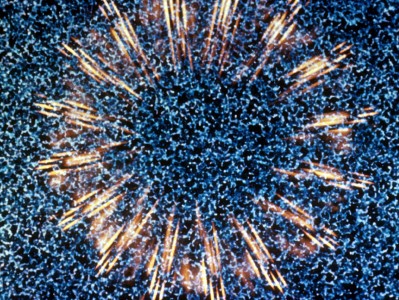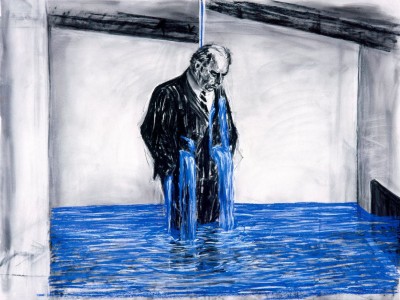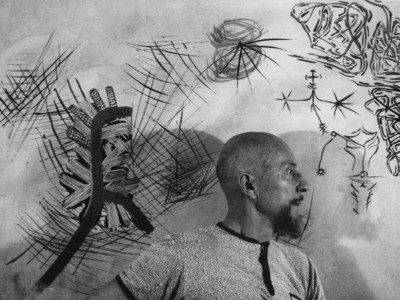
Jordan Belson: Films Sacred and Profane
The mesmerizing and otherworldly films of Jordan Belson (1926-2011) mark one of the unsurpassed high points in the history of post-WWII American experimental cinema. Defining a mode of rigorously and sublimely pure cinema, Belson’s films invent spellbinding abstract forms in order to engage and expand perceptual experience, exploring a realm beyond habitual vision and somewhere deeper within human consciousness. Belson’s long fascination with space travel and Eastern religions guided his exploration of light as a sculptural element, imbued with celestial, ethereal and mystical properties. In now iconic works such as Allures, Re-entry, Samadhi and the aptly named Light, Belson radically transformed the abstract film as defined earlier by Oskar Fischinger and Norman McLaren into an immersive and meditative experience, opening swirling, glittering depths in the screen for the “mind’s eye” to travel. Rarely acknowledged are the ways Belson’s films were in dialogue with the most progressive art of its time, both the op-art of Bridget Riley and the Light and Space movement of the 1960s of Robert Irwin, Peter Alexander, et al., the West Coast school of minimalism that discovered a kind of vernacular sacred within the intense Southern California sunlight.
Belson first trained as a painter before discovering his love of cinema at the 1946 legendary Art in Cinema series at the San Francisco Museum of Art where he was first introduced to the work of Fischinger, McLaren and Hans Richter that would exert a profound influence upon him. Determined to become a filmmaker, Belson experimented with remarkable success with traditional single-frame animation techniques, resulting in engaging early works rarely screened today. Beginning in 1957, Belson began a collaborative and extraordinarily creative enterprise that would alter the course of his career- a series of pioneering son et lumière shows designed and executed with the composer and sound artist Henry Jacobs in San Francisco’s state-of-the-art Morrison Planetarium. For two years Belson and Jacobs dazzled Bay Area audiences with their “Vortex Concerts”, intricate live performances that transformed the planetarium into a unique kind of cinematic space, harnessing the scientific technology as well as projection and sound apparati to creative a heroic early expression of “expanded cinema”. Anticipating both the psychedelic light show and the art of the VJ, the widely popular Vortex Concerts continued until the planetarium management abruptly ended the series in 1959.
This experience with live projection performance channeled directly into Belson’s break-through film Allures, his first work to turn away from traditional animation techniques and to explore the plastic qualities of light as a sculptural element. Subsequent films continued in this vein while delving further into the cosmic realm presaged by the planetarium shows. While working diligently as an independent filmmaker within the flourishing West Coast scene, Belson’s visionary cinema caught the eye and imagination of Hollywood, with Donald Cammell making use (with Belson’s permission and an official licensing agreement) of Belson’s imagery for Cammell’s controversial science fiction film The Demon Seed. Philip Kaufmann went even further by hiring Belson to design key special effect sequences for his rousing bio-pic epic of the first American astronauts, The Right Stuff. Belson’s wonderful “fireflies” sequence gave form to the cosmic flares seen by John Glenn on his return to Earth, a voyage that had earlier inspired Belson’s remarkable Re-entry. In later years Belson became increasingly reclusive, shying from the public light and any kind of interviews and withdrawing most of his titles from circulation, citing concern that poor print and projection quality was compromising his art.
Belson’s work remained largely unseen for many years until the Center for Visual Music undertook an ambitious preservation initiative focused on Belson and the work of other abstract filmmakers. Presented in association with the CVM, the program includes a number of key titles recently preserved by the Center as well as Belson’s marvelous final film, Epilogue which was commissioned by the Hirshhorn Museum for their vitally important Visual Music exhibition. The Harvard Film Archive is pleased to welcome Center for Visual Music curator and archivist Cindy Keefer to present an exciting showcase of Belson’s cinema that includes both new preserved titles and rare archival prints. – Haden Guest
PROGRAM
-
Caravan
Directed by Jordan Belson.
US, 1952, 16mm, color, 4 min.
Music by Dizzy Gillespie
Print source: Center for Visual MusicSéance
Directed by Jordan Belson.
United States, 1959, 16mm, color, 4 min.
Print source: Center for Visual Music
Allures
Directed by Jordan Belson.
US, 1961, 16mm, color, 8 min.
Sound by Belson and Henry Jacobs
Print source: Center for Visual Music

Re-entry
Directed by Jordan Belson.
US, 1964, 16mm transferred to digital video, color, 6 min.
Copy source: Center for Visual MusicMomentum
Directed by Jordan Belson.
US, 1968, 16mm, color, 6 min.
Print source: Center for Visual Music
Chakra
Directed by Jordan Belson.
US, 1972, 16mm, color, 6 min.
Sound by Belson
Print source: Center for Visual Music

Light
Directed by Jordan Belson.
US, 1973, 16mm, color, 6 min.
Sound by Belson
Print source: Center for Visual Music
Cycles
Directed by Jordan Belson and Stephen Beck.
US, 1974, 16mm, color, 10 min.
Music by Stephen Beck
Print source: Center for Visual Music
Music of the Spheres
Directed by Jordan Belson.
US, 1977, digital video, color, 7 min.
Music by Iasos
Copy source: Center for Visual Music
Related film series












